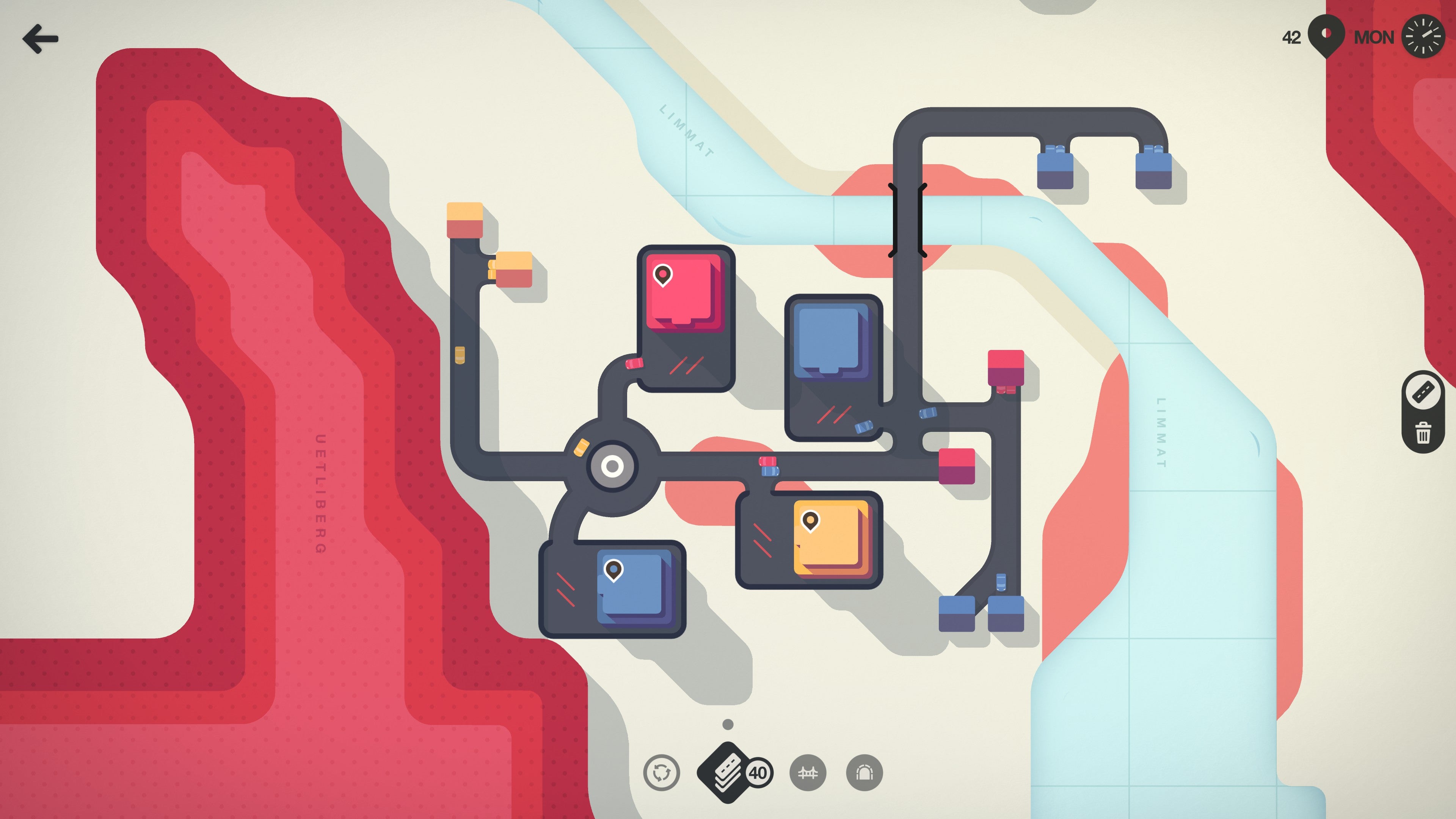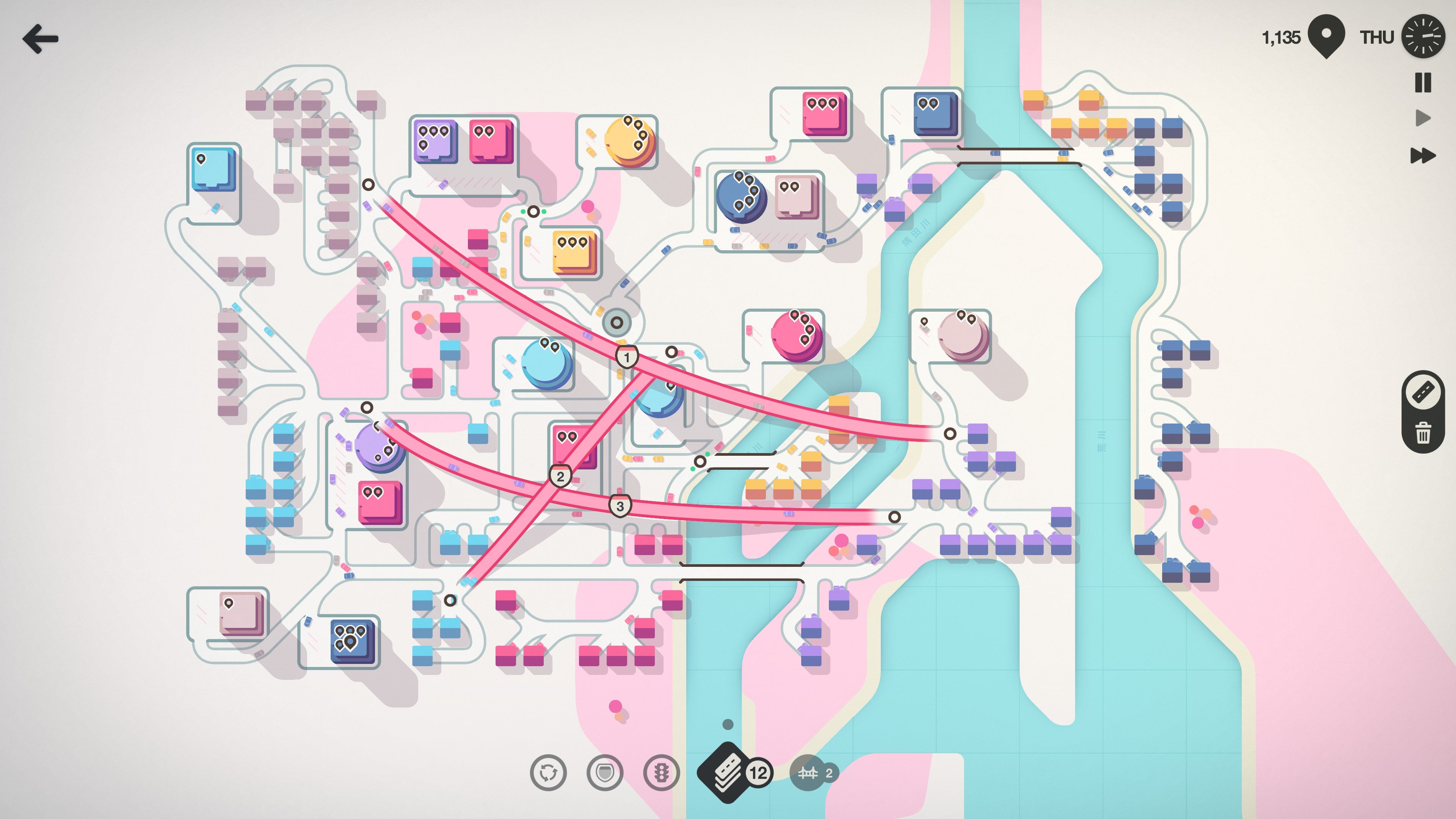Even with some of today’s most iconic conurbations such as LA, Tokyo and Dubai reduced to their neatest, simplest geographical lines and land masses, I still manage to make a pig’s ear of laying down a functioning road network. Just when I think I’ve got a handle on ferrying each city’s busy commuters between their homes and giant industrial centres, something inevitably goes wrong. The pins stack up, jams back up for miles, and gridlock eventually brings the whole city to a crashing halt. But by golly is it fun. Even with the action taking place above ground this time, the general rhythm of Mini Motorways will feel instantly familiar to previous Metro heads. Like its subterranean predecessor, Mini Motorways starts small, the camera focused tightly on just a small cluster of map tiles. Whereas before you were joining up subway stations to get people to their intended destination, Motorways sees you building roads between houses and increasingly busy shopping centres. These colour-coded depots gradually fill up with little pins, at which point a car of the corresponding colour will pull out of their drive and go and collect it, like an ant’s nest of frantic Deliveroo drivers. The more pins you collect, the higher your overall score at the end. It’s not the most environmentally friendly picture in the world (we can always pretend they’re electric cars, can’t we?), but having your citizens on the road like this does create a much busier and more authentic picture of your city’s overall progress than the abstract shapes queuing up at its predecessor’s metro stations. Crucially, that busyness doesn’t come at the cost of clarity, especially when things start to go wrong. As time goes on, your top-down view gradually expands, allowing more houses to crop up on the map, as well as more shopping centres for them to drive to. To begin with, these houses tend to crop up in rough, colour-coded zones. You might get lots of red houses congregating together in one part of the map, for example, while a bunch of blue and yellow developments appear in opposite corners, making it easier to funnel certain colours in a specific direction. Eventually, though, rogue houses start cropping up all over the place, signalling the next step in your road-building puzzle empire. It’s at this point where my cities usually collapse, but simply being able to see those conflicting colours fight against the tide of their new neighbourhood already makes the map and its pressure points much easier to parse than the jumble of microscopic shapes getting antsy in Mini Metro. I have a better sense of what to do next time, which is something I never really got at the end of a Metro run. Of course, the thrill of Mini Motorways (much like Metro before it) is in redesigning your road network on the fly, drawing new roads with a click and drag of your mouse in real time - although you can always hit pause and take a more considered approach if you want to. In another nod to the first game, getting to the end of the week earns you more tools to play with, giving you a choice of what to bring with you into the week ahead. Each week’s options are randomised, so one week you could be choosing between a straight 30 road tiles or 20 road tiles with a roundabout (the latter of which can help ease the flow of traffic at big junctions), while another might give you 20 road tiles along with the choice of a traffic light, tunnel, or a bridge. Making these risk and reward decisions is all part of the fun, but where Metro’s puzzle pieces focused on making things more efficient (giving you tunnels, extra subway lines, carriages and interchanges to play with), Motorways shifts its puzzling element onto the city’s topography. What was once the friendly white space of a London tube map is now filled with geographical challenges, such as hills, valleys, rivers, islands and coasts. Mini Metro dabbled in the latter aspect, giving you tunnels to combat its cities’ various waterways and the like, but here building an effective road network is as much about mastering the environment as it is making effective use of your building tiles. This is particularly true of the game’s titular motorways, which soar above the daily rat-run taking place on the streets below to create fast, arterial expressways. These motorways are powerful puzzle pieces. They need to be a certain length, but technically they can be as long as the map allows for, and can also stand in as makeshift bridges. It’s why they only come with an additional ten road tiles as opposed to 20 or 30 like some of the other options you’re presented with, as any more and Motorways’ carefully calibrated pressure engine would feel off. Motorways do have one weakness, though. They can’t go over mountains, and it’s in these moments that you still feel subservient to the landscape around you - and that’s great, as it makes each city feel like a distinct challenge now rather than simply more of what’s come before it. Most of all, though, Mini Motorways is just jolly good fun. The slow, almost imperceptible zooming out of its camera always makes me smile when I suddenly break out of my Zen-like focus and realise how far I’ve come in a particular run, and the gentle, ambient hum of its soundtrack never fails to put me at ease - even when it’s punctuated with subtle beeps and horns from my backed up commuters. Cues like this help alert you to potential problems in your network, but also let you keep a calm head, and I rarely felt stressed or overwhelmed when my cities went awry. And besides, the beauty of Mini Motorways is that it’s meant to be played over and over again, letting you chase those high scores with your newfound knowledge when everything goes pear-shaped. In short, its more varied puzzle pieces, greater environmental challenge and clearer visual presentation all add up to make Mini Motorways a worthy evolution of Dinosaur Polo Club’s minimalist transport formula. Despite appearing first on the Apple Arcade, Mini Motorways feels right at home on PC, and its intuitive mouse controls make for a much better architect’s pen than a motion controlled remote. Add in daily and weekly challenges to its bumper crop of mainline maps (with more to come every few months after launch, as well as new game modes and the same breadth of updates we saw in Mini Metro) and Mini Motorways is a fine second outing for this vehicular puzzle series. Dedicated Mini Metro-ites may find Motorways a tad too familiar for it to enter their own god tier of video games, but if you’re hungry for more of what Dinosaur Polo Club do best, then this is one diversion you won’t want to miss.

